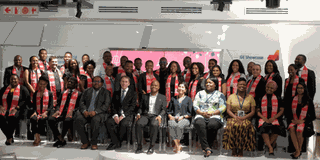13 Kenyans to benefit from Sh50 billion digital fund

AIIP class of 2019. PHOTO | FAUSTINE NGILA | NATION MEDIA GROUP
What you need to know:
The Programme includes regular assessments in each module culminating in a final project where participants are tasked with applying their learning to solve an existing problem either in their business or in a partner organisation’s business operations.
This is achieved through modules in machine learning and big data analytics, Industrial Internet of Things (IIoT) and Cloud-based Application Development.
Thirteen Kenyans are among more than 30 young African set to benefit from the third cohort of the Africa Industrial Internet Programme (AIIP) multi-billion-shilling fund aimed at equipping young Africans with skills needed in the Fourth Industrial Revolution (4IR).
The 2020 cohort organised by General Electric (GE) and the Africa Leadership University (ALU) has enrolled 35 students from eight countries across Africa, drawn from energy, transport, manufacturing, healthcare, telecoms and aviation industries.
Over the last two years, the rigorous training programme has graduated 64 students from Kenya, Uganda, Rwanda, Ethiopia, Ghana, Nigeria, South Africa and Botswana, of which 50 were fully sponsored by GE from a scholarship fund totalling Sh50 billion.
“As a digital industrial company, it is exciting to see how over the last two years the AIIP has developed an ecosystem of digital engineers that utilise data science as an enabler for their work across industries, developing solutions for the most pressing challenges.
“Our partnership with ALU for the AIIP is a testament of our commitment to develop the next generation of leaders that will drive solutions made in Africa for Africa in this transformative digital age,” said Farid Fezoua, chief executive of GE Africa.
Launched in 2018, the programme has empowered participants with essential skills for building applications for the Industrial Internet, which enables machine-to-machine communication, resulting in systems that can collect, analyse, and deliver data in real-time.
These features provide significant benefits such as predicting when a device will require maintenance, enhancing logistics management, boosting quality and optimizing safety.
The training takes place at a time when spending on the Internet of Things (IoT) is predicted to reach a trillion US dollars by 2021, with the total number of connected devices being projected to rise to 75.44 billion worldwide by 2025, a fivefold increase in 10 years.
Kenya’s Elizabeth Olwande, one of the beneficiaries of the project said the programme has equipped her with new perspectives and skills for the future of industries.
“Over and above difficulty, I have learned so much and I have grown a lot. I used to rely on first principles in whatever I did but with the course, I am looking at things differently to extract insights from what I am actually seeing from the data," she said.
Edward Opoku from Ghana sees his future in Big Data, as the field keeps impacting business decisions and processes.
“The AIIP is a unique experience and dive into the world of data and analytics. It gives you an entire spectrum of what it takes to survive in the world of data science. Through AIIP, I was able to meet passionate professionals and challenge our assumptions on the impact of data, and what it can bring to the continent and ultimately to the world,” he said.
South Africa’s Matlotlo Magasa came into the program feeling like just a chemical engineer, worried about python programming and not sure about grasping new technologies.
“Python is not only a friendly coding language but I have the ability to get data from the company and analyse this easily using data analytics and visualization, to employ design thinking in approaching problems,” she told the Nation.
The AIIP is designed using a project-based approach where participants get to apply their learning in real world contexts.
The Programme includes regular assessments in each module culminating in a final project where participants are tasked with applying their learning to solve an existing problem either in their business or in a partner organisation’s business operations.
This is achieved through modules in machine learning and big data analytics, Industrial Internet of Things (IIoT) and Cloud-based Application Development.
A unique aspect of the programme is a deliberate focus on creating links to industry for participants by inviting industry experts to intensives to share case studies, projects of interest, trends and opportunities, through industry field visits and mentorship opportunities with data science professionals.
“African Leadership Group is thrilled to be partnering with GE to build a new generation of digital leaders for Africa,” said Fred Swaniker, Founder of African Leadership Group, which includes African Leadership Academy, African Leadership University, and ALX.
“We share GE’s passion for data, and what it can bring to the African continent and the world. The programme enables mid-career engineers to build new skills in data analytics, data science, data engineering and data visualisation.”
By leveraging the power of data, today’s engineers can significantly improve the performance of high-tech industrial machinery and processes, thereby increasing the bottom line for companies in the 4IR.
“The Africa Industrial Internet Programme is creating globally competitive, digital engineers right here in Africa, and we can’t wait to see their full impact on the continent”.
GE will give 10 full scholarships for the current cohort.




